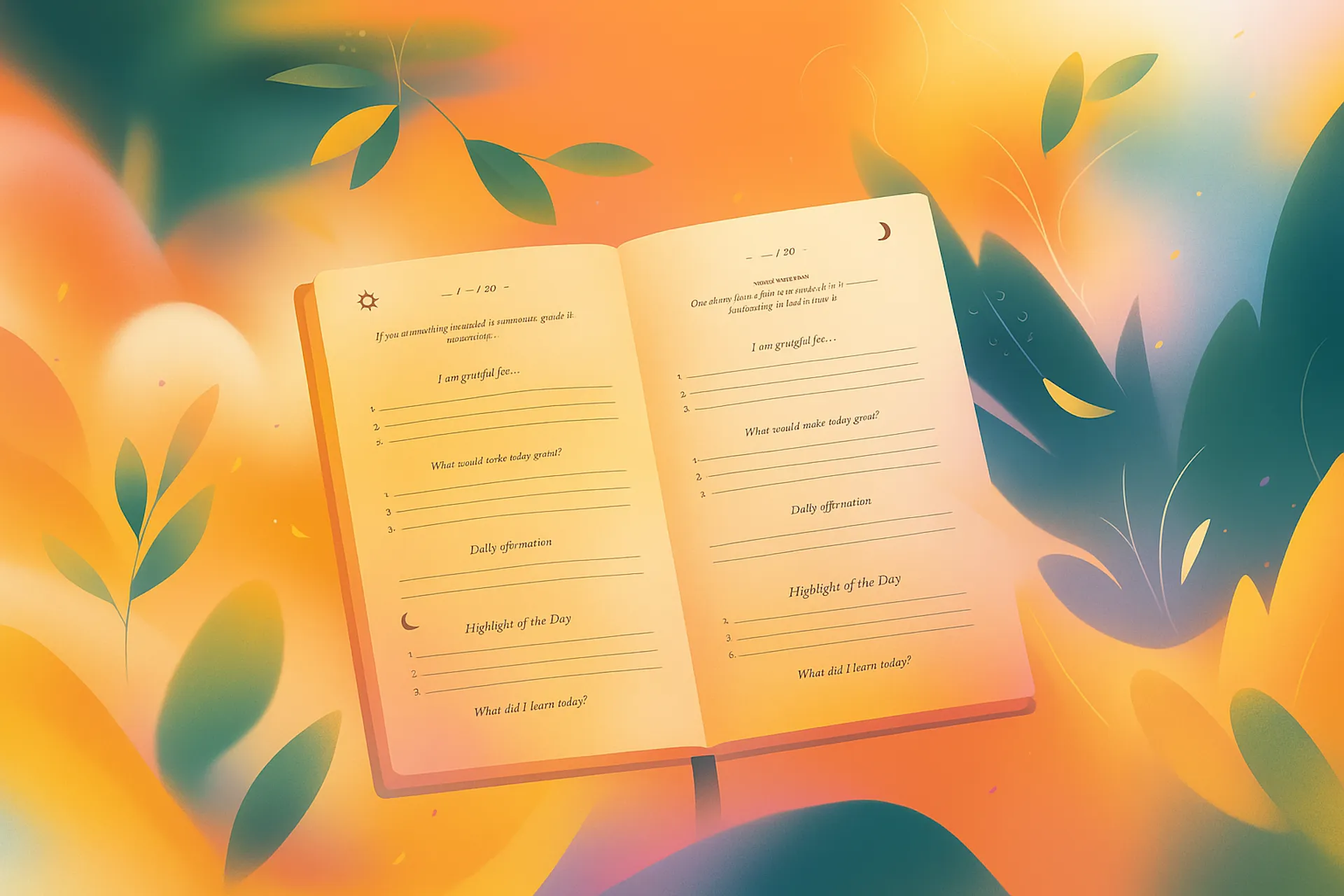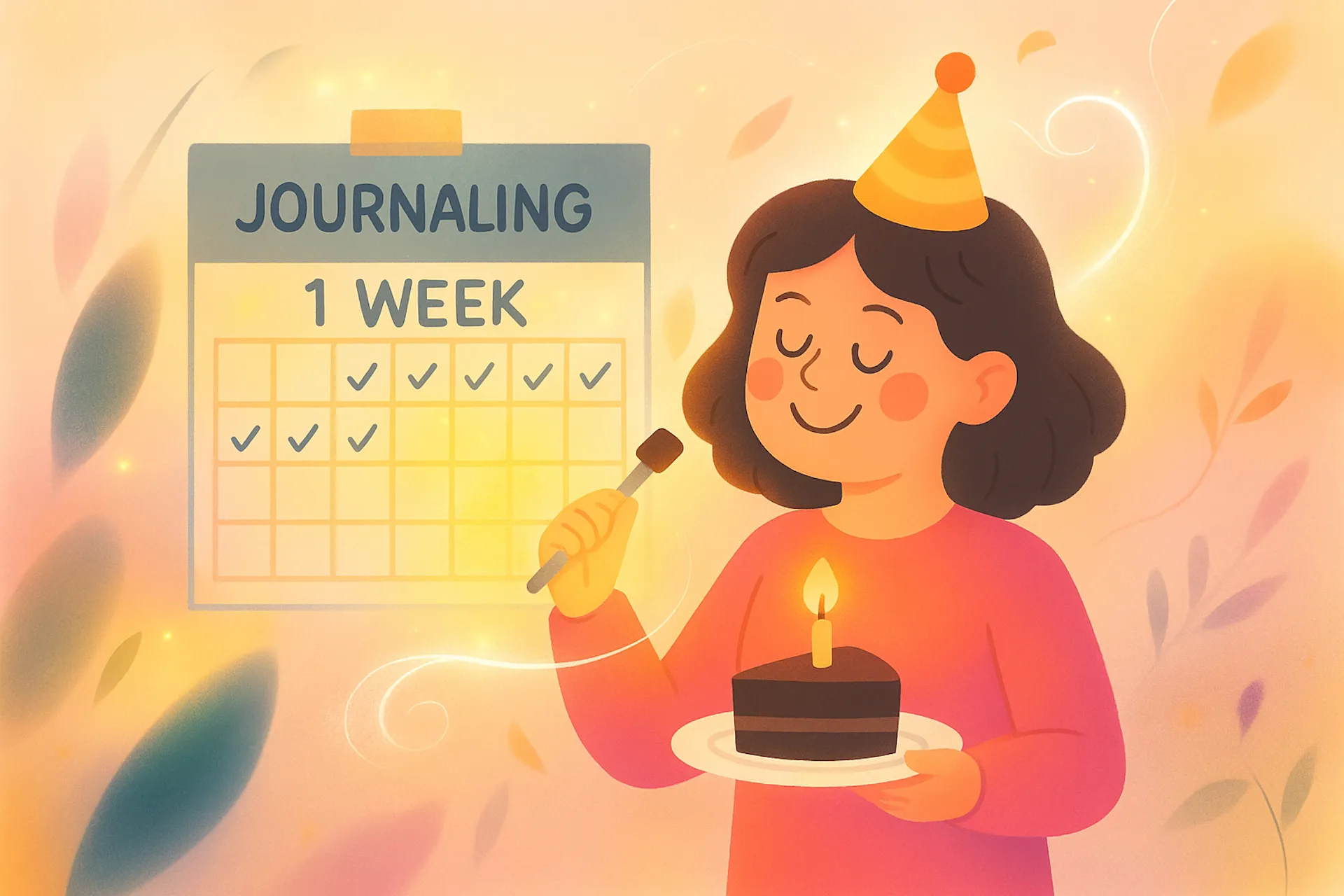
Stay Consistent with Journal Writing to Reduce Anxiety

Anxiety is often called the illness of the 21st century, and for a good reason. Our modern lives are full of constant decisions, information overload, and endless to-do lists. According to research conducted by the Institute of Cognitive Science, the average adult makes between 33,000 and 35,000 decisions every single day. From small choices like what to eat for breakfast to life-shaping decisions about work, relationships, and finances. All these thoughts and pressures (not to mention the endless stream of content we scroll through on social media) often lead to stress, anxiety, and even burnout.
Journaling can help and sticking with it makes a big difference ✨
These days, most people have at least heard of mental health journaling. But the real question is: how does it actually help reduce anxiety? According to Harvard Medical School research, expressing your worries, rather than holding them in, can calm the brain. Putting your thoughts on paper helps offload mental clutter, making your brain less reactive and more focused. This frees up mental energy and supports better concentration and task completion. Think about how much lighter you feel after talking to colleagues about your stressful boss, asking friends for advice before buying a car, or simply sharing your worries with a partner. Journaling works in a similar way. It gives you space to release emotions and clear your mind in the everyday chaos. What’s more, it is even better not to place every single thought on the people close to you. In those moments, journaling can be your supportive practice.
But here’s the catch: most people fail to stick with journal writing. I’m sure you know the feeling – you buy a brand-new notebook and a pen, feel inspired for a few days or weeks, even notice your mood lifting… and then, months later, your pretty journal is quietly gathering dust on the shelf.
Calm down, you don’t need to feel ashamed – life gets busy, and journaling can easily slip down the priority list. After a long day, sitting with a notebook and trying to sort your thoughts can feel like a chore. Then there’s the dreaded blank-page anxiety – staring at an empty page can be intimidating, especially when you feel the pressure to make it perfect.
Ways to stay consistent with journaling:
Keeping up with journaling isn’t always easy, but it doesn’t have to feel like a duty. Try these simple tricks to make it fun, effortless, and something you actually look forward to doing.
1. Use a template
We all have different strengths – writing might not be your thing, and that’s fine. So instead of pushing yourself too hard to be creative in your journal, try using a prepared structure. Templates give you a starting point, remove the pressure of a blank page, and make it easier to get your thoughts down. Think of them as a gentle guide that helps you stay consistent without stifling your voice – because journaling should feel inspiring, not stressful.

A simple and popular way to guide your journaling is the ABC framework:
- A (Activating Event): What happened? Example: A colleague criticized my work.
- B (Beliefs): What did you think about it? Example: I thought I wasn’t good at my job.
- C (Consequences): How did it make you feel, and what was the impact? Example: I felt frustrated, which lingered all day.
This approach gives you a clear path to follow, so you can reflect and process your feelings without worrying about what to write next. There are plenty of other frameworks and templates for any type of journaling – whether it’s a work journal or a gratitude journal. You can find the one that fits you best and makes your journaling routine easier and more enjoyable
2. Make it easy with an app

Sometimes it feels like life expects us to do it all – work hard, stay in shape, keep learning new things, be there for our family, make time for hobbies, and still catch the latest movie so we don’t feel left out in conversations with friends. No wonder nowadays we even eat on the go. With so much going on, finding even 10 extra minutes to sit down and journal can feel impossible.
The good news? You can forget about messy handwriting or the pressure to get every word perfect and you don’t even need extra time for writing or even typing journal, you can just record it. With Letterly, you can simply speak your thoughts out loud, and the app will turn them into a clean, organized entry. It even sends gentle reminders and keeps everything stored in one place, so your habit doesn’t fall apart when you forget your notebook at your parents’ place or go away on a work trip. Let’s be honest – you might forget your journal notes on the shelf, but your phone is always in your pocket and with it, your journal AI. With an AI powered app like Letterly, you can also explore new horizons in journaling. For example, you can create different templates and prompts for your routine, such as a gratitude journal, a six-minute reflection journal, a productivity check journal, even a journal for work. Such variety will keep you engaged. By making journaling simple, flexible, and stress-free, Letterly takes away the friction and helps you stay consistent. That way, you can actually enjoy the benefits like reduced anxiety and greater clarity, instead of stressing about keeping up the habit.
3. Set a specific time
Even just five to ten minutes a day can make a noticeable difference, but the real magic happens when you do it consistently.
For many people, journaling fits naturally into either the morning or the evening. Writing in the morning can feel like clearing your desk before starting work – it gives you space to organize your thoughts, set priorities, and begin the day with intention. It’s a way of saying, “Here’s what matters to me today,” instead of letting the flood of emails or notifications decide for you.
On the other hand, journaling at night acts more like an emotional exhale. Before bed, reflecting on your day helps release stress, untangle lingering thoughts, and process any emotions that might otherwise keep you awake. It’s almost like brushing your teeth, but for your mind – you go to sleep with a cleaner, lighter headspace.
Of course, the best time to journal is the time that actually works for you.
4. Start small and be gentle with yourself
Don’t pressure yourself to write long, perfect entries. Some days, one or two sentences are enough. Don’t stress about making your journal text Pulitzer award-worthy. What matters is the habit, not the length or quality of your writing. Over time, even short reflections can accumulate into meaningful insight and decrease your anxiety!
5. Celebrate your progress
It’s surprisingly easy to dismiss the little things we do for ourselves, but when it comes to mental health journaling, those small wins really matter. Even a few lines scribbled between meetings or a quick voice journal note captured on your way home count as progress.

One of the best ways to stay motivated is by tracking your progress. Many people find it helpful to keep an eye on their streaks, review past entries, or set tiny milestones. Looking back through your journal after a week, a month, or even a year can be a powerful reminder of how far you’ve come and how much you’ve grown. Sometimes the changes are subtle: you might notice that situations that once felt overwhelming now barely rattle you, or that you’re quicker to find clarity in stressful moments.
And don’t forget the simple act of acknowledging yourself. Just showing up, even on the busiest or hardest days, is worth celebrating. Think of journaling less like a homework assignment and more like a gift for your future self.

